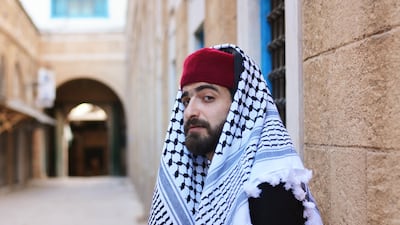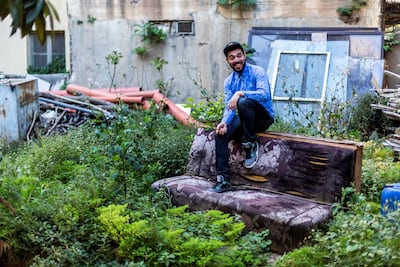Hip-hop may not be synonymous with the Middle East, but for the region's rap artists, it is a musical genre that brings joy to the soul and hope for a better tomorrow.
Eight years after it was credited with playing a prominent part in sparking the Arab uprising, rap has continued to blossom across the Middle East, with adherents from the likes of Lebanon, Jordan and Palestine laying beats to the hip-hop drum.
Ibrahim Ghunaim is also known as MC Gaza. His desire for musical stardom has taken him from his native Gaza to his current residence in Tunis, which he moved to this year. "It has been 13 years since I started rapping – and now it's my whole life," says Ghunaim from his home in the Tunisian capital.
The 26-year-old artist, who says he has produced more than 100 songs and in excess of 40 videos, was bitten by the hip-hop bug as a teenager after he first bought a ticket to a rap gig in the Palestinian territory in 2005. One year later, he began performing, and has pursued a dream to be "the voice of Gaza" ever since.
His songs focus on human and women's rights, and the myriad other social concerns impacting the 1.9million people in the enclave bordered by the Mediterranean Sea, Israel and Egypt. "I'm talking about what I see, I'm talking about what I don't see and I'm talking about what I want to see," he explains.
Nasser Shorbaji is another artist who has embraced hip-hop with thoughts of glory and a view to spreading his peace-loving message. Shorbaji, aka Chyno (pronounced Cheeno), is of Syrian-Filipino heritage, and today drops beats in the Lebanese capital, Beirut. "I started listening to hip-hop in 1993," says the former banker, who ditched a career in finance to concentrate on music. "I found a sense of community by watching the first hip-hop video I had ever seen, Hip Hop Hooray by [American group], Naughty by Nature."
The 34-year-old artist, who was born in the Philippines to a Syrian father and a Filipino mother, says this genre of music comforted him as a lonely child trying to settle into the Middle East. He moved to the region after spending the first five years of his life in his birthplace.
"I wanted to be a part of something," he explains. "And I guess subconsciously, that's why I was attracted to the video – other than the fact that it was the coolest thing I had ever seen in my life at that point."
Rap and the Middle East may not have a long history – but MC Gaza and Chyno are just two of many Arab artists who are currently plying their trade in the region. Indeed, Sunaina Maira, a professor of Asian American Studies at the University of California, Davis, and author of Jil Oslo: Palestinian Hip Hop, Youth Culture, and the Youth Movement, says the birth of hip-hop in the Middle East has colourful roots. "To my knowledge, rap, Arabic and hip-hop in the region were actually inspired by musicians from the Maghreb," she says. "So Maghreb musicians were actually pioneers in trying to fuse Arabic rap with indigenous music, including rhyme."
Maira says the above led the movement as it began to spread to other Arabic-speaking youth cultures across the Middle East. "In the case of the Levant and Palestine, it was actually Palestinian hip-hop that was in the lead," she tells me.
Maira states that Arab rappers have long had to answer to the charge of being heavily influenced by the West, owing to hip-hop's American origins, but she adds that rap and Middle Eastern culture are not entirely poles apart."Hip-hop is based on a tradition of oral poetry – which is actually intrinsic to Arabic poetry," she explains. "The mixing of Arabic rap and lyrics with different forms of Arabic instrumentation and Arabic poetry have indigenised it."
For the likes of MC Gaza and Chyno, hip-hop offers a unique way to talk about the world around them. And just as Tunisian rapper El General became a poster boy for the country's Arab Spring protesters after he released a track of raw fury against then-president Zine el-Abidine Ben Ali in 2010, other artists across the region have found solace in the bold beats of this genre. A number of female acts have also started to drop hip-hop beats in the Middle East.
Ghunaim, who left Gaza for Tunisia earlier this year so he could progress his career, says there was no better way to "reach people's hearts" than to sing hip-hop.
_________________
Read more:
Not too Shaabi: Praed orchestra take Egyptian street music to Sharjah
Oslo World Music Festival to pay tribute to late Palestinian singer Rim Banna
Iraqi heavy metal band Dark Phantom takes its ‘fight for freedom’ to Syria
_________________
Chyno agrees – and adds that rap is able to express a raw emotion unparalleled in any other music genre. "We can be more intricate with our emotions," the rapper says of the appeal of hip-hop, compared to more traditional forms of Arabic music. "We can go in-depth about how we feel a little bit more."
Chyno, a childhood nickname that stuck, first established himself with Lebanese hip-hop band, Fareeq El Atrash, before going solo. He laments what he sees happening in Syria where he partly grew up. His first solo album, Making Music to Feel At Home (2015), spoke directly to his feelings about his family's war-torn homeland. He is well-travelled, but has a somewhat complex relationship with his mixed heritage, he reveals.
"I have a song called Haram from the album and that strictly talks about my guilt of being away from Syria and having a good time, and questioning myself," he elaborates.
The artist, who raps in English as well as Arabic, sees a bright future for hip-hop in the Middle East; he is also the brains behind The Arena – a battle rap league based in Beirut.
"I'm very excited about what's happening with hip-hop in the region," he says. "There are a lot of acts who are very self-reflective, aware about what's going on, and apart from that, very gifted. The Arena showcases a lot of great talents and wordsmiths."
Ghunaim has his eyes firmly planted on success – and triumph further afield in Europe. He is so determined to follow his passion for rap, even though he says he has found it painful leaving his mother and brother, who has Down Syndrome, behind in Gaza – but felt compelled to pursue his dreams of rap stardom. He hopes he can realise his ambitions to make music his career, and tour the world with his own brand of hip-hop.
But wherever he goes, the man known as MC Gaza has pledged to never forget his roots and has vowed to carry Palestine in his heart for all time.
"When you are performing rap, you must write about your own problems," he says. "And nobody has problems like Gazans."


